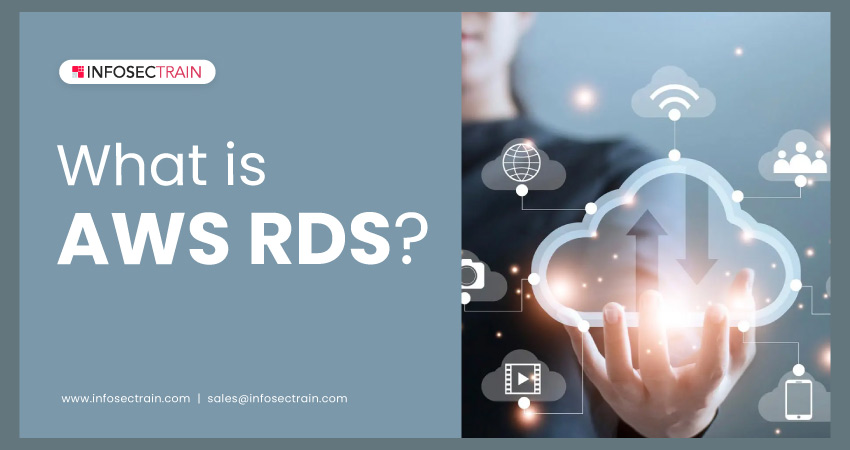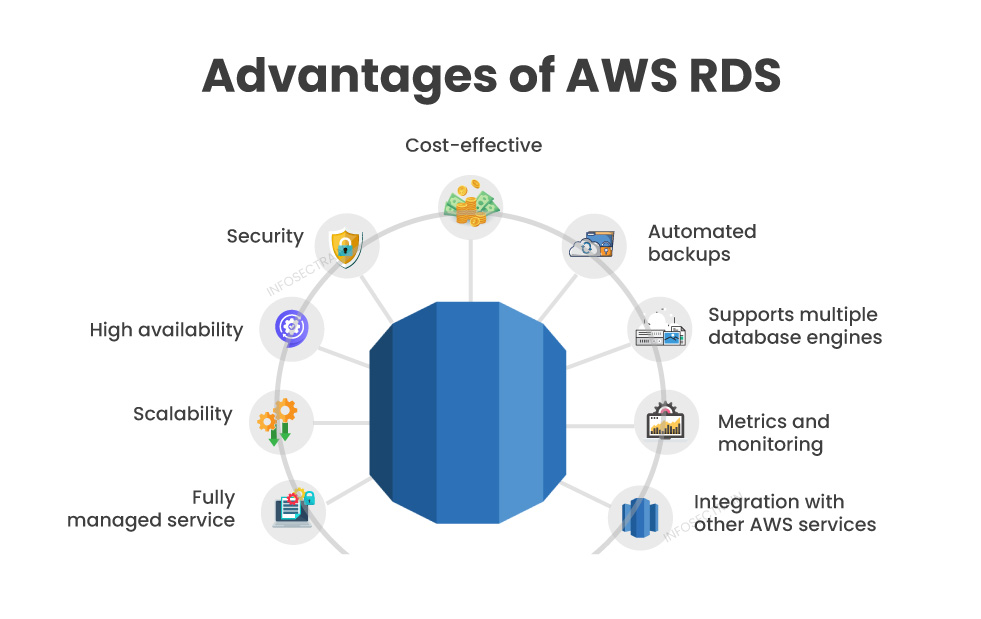What is AWS RDS?
Due to the growth of digital data and the necessity for reliable and efficient methods to store, manage, and analyze it, database services have grown significantly in today’s technologically advanced world. Today, databases are the backbone of many modern applications and services. With cloud-based database services, organizations can quickly scale their database resources as needed and pay only for what they use, making it a cost-effective solution for managing data. Therefore, most organizations use AWS Relational Database Services (RDS) to store, manage, and retrieve large amounts of data efficiently and securely. AWS Relational Database Services (RDS) provide scalability, automatic backups, disaster recovery, and high availability, reducing database management burden.

Table of Contents
What is AWS RDS?
Use cases of Amazon RDS
Advantages of AWS RDS
AWS RDS Database Engines
In this blog, we will dive deep into the AWS RDS.
What is AWS RDS?
AWS Relational Database Service (RDS) is a cloud-based service offered by Amazon that provides users with easy-to-use, highly available, and scalable relational database management systems. With AWS RDS, users can easily configure, scale, and operate a relational database in the cloud without managing the underlying infrastructure. It helps in routine database tasks such as software patching, backups, and monitoring, which allows users to focus on application development.
Use cases of Amazon RDS
Some of the most common use cases of AWS RDS include the following:
- Web applications: It can be used to power web applications, providing a scalable and highly accessible database backend for applications built on platforms like WordPress, Drupal, Joomla, and many others.
- Mobile applications: It can be used as a backend for mobile applications, providing a scalable and highly available database service for applications that need to store and retrieve data in real time.
- Disaster recovery: It can be used to set up and manage standby databases and read replicas in different regions or availability zones, providing a reliable disaster recovery solution for critical applications.
- E-commerce: It can store and manage product catalogs, order histories, and customer data for e-commerce websites and applications.
- Analytics and business intelligence: It can store and manage large volumes of data for analytics and business intelligence applications, providing fast and reliable access to data for reporting and analysis.
- DevOps: It can be integrated with other AWS services to automate database deployment and management as part of the DevOps process.
Advantages of AWS RDS
There are several advantages of using AWS RDS, including:

- Fully managed service: It is a fully managed service. It handles the provisioning, configuration, and maintenance of the database infrastructure, including backups, software updates, and security patches.
- Scalability: It allows users to easily scale the database infrastructure up or down as application requirements change without requiring manual intervention.
- High availability: It provides high availability options, such as Multi-AZ deployment and read replicas, to ensure the database is always available, even during a hardware failure or network disruption.
- Security: It includes various security features, including encryption at rest and in transit, network isolation, SSL/TLS encryption for data in transit, and access controls, to help keep data secure.
- Cost-effective: It offers a pay-as-you-go pricing model, allowing users to pay only for the resources they use and avoiding the need for upfront capital expenditures on hardware and infrastructure.
- Automated backups: It automatically backs up users’ databases and stores them in Amazon S3. Users can restore their databases to any point within the backup retention period.
- Supports multiple database engines: It supports various database engines, including MySQL, PostgreSQL, Oracle, Microsoft SQL Server, and Amazon Aurora, allowing users to choose the database engine that best fits their needs.
- Metrics and monitoring: It provides metrics and monitoring capabilities, allowing users to monitor the performance of databases and set up alarms to notify of any issues.
- Integration with other AWS services: It integrates with other AWS services, such as Amazon CloudWatch, AWS IAM, and AWS Lambda, allowing users to automate and manage the database resources more effectively.
AWS RDS Database Engines
Below is a list of the database engines that can be used with Amazon RDS:
- Amazon Aurora: It is a MySQL and PostgreSQL-compatible relational database engine designed to be highly scalable and available. It is a fully managed service that provides fast performance, automatic backups, and failover.
- MySQL: It is a popular open-source relational database engine that is widely used in web applications. It provides automatic backups and software patching.
- MariaDB: It is an open-source relational database management system designed to be faster and more scalable than MySQL. It provides improved performance, enhanced security, and additional storage engines.
- PostgreSQL: It is an advanced open-source object-relational database system. Its extended features make it suitable for web applications, data warehousing, and business intelligence.
- Oracle: It is a widely used commercial relational database engine in enterprise applications. It supports several editions of Oracle, such as Oracle Standard Edition One, Oracle Standard Edition Two, and Oracle Enterprise Edition.
- Microsoft SQL Server: It is a commercial relational database engine widely used in enterprise applications for managing large amounts of data.
You can also check out related blogs:
- Why Learn AWS In 2023?
- Top interview questions for AWS Solutions Architect
- Security Products and Features of AWS
- Career Benefits of AWS Certifications
- EC2: The AWS Compute Service
How can InfosecTrain help?
AWS has grown enormously in recent years and has been the largest provider of cloud computing services with a wide range of customers since its inception. Understanding various AWS services, such as AWS RDS, is essential for you and your organization to embrace cloud computing to increase IT infrastructure and operations scalability, cost-effectiveness, and efficiency.
InfosecTrain is a significant provider of various IT security, cloud, data privacy, and data security training and consulting services. We provide various AWS certification training courses to help you enhance your knowledge and demonstrate your skills and working experience on AWS. You can learn more about the AWS services in our AWS Certified Solutions Architect certification training course with our highly skilled industry expert trainers.
You can also check out our AWS Combo online training course to enhance your overall AWS architecture knowledge.




 1800-843-7890 (IN)
1800-843-7890 (IN) sales@infosectrain.com
sales@infosectrain.com
 1800-843-7890 (India)
1800-843-7890 (India) 
